2020 Survey
CONDUCTED BY WOMEN’S JUSTICE NOW & NOW-NYC
RELEASED AUGUST 2021
Twenty anti-violence organizations and rape crisis programs that work directly with an estimated 5,000 diverse survivors of sexual assault and rape annually across all five boroughs responded to this survey for the 2020 calendar year. Organizations were told that all questions on police response were specifically referring to the NYPD’s Special Victims Division (SVD).
Key Findings
Overall Quality of SVD Response
When asked how providers would rate the job SVD is doing in responding to survivors of sexual assault or rape, 13 out of 20 organizations (65%) said “Not so good” or “Poor.” Only 3 out of 20 organizations (15%) said “Good,” and 0 organizations said “Excellent.”
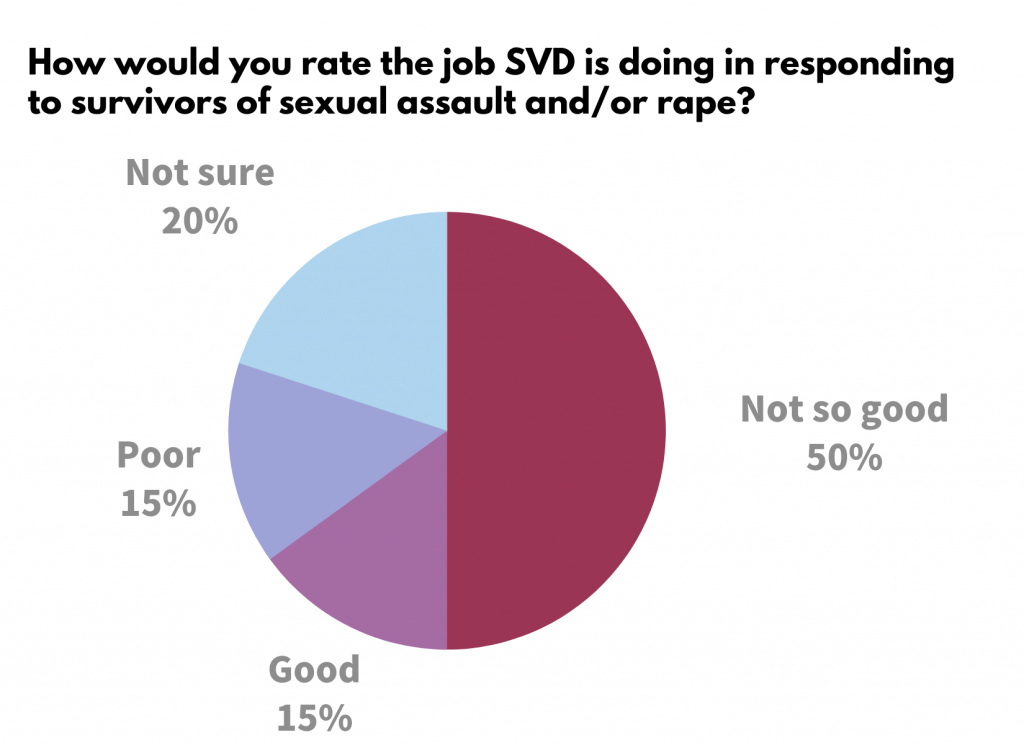
Consistency of SVD Response
All 20 organizations responded that the quality of SVD investigations varies widely (19) or that SVD handles these cases poorly most of the time (1). Not one organization said that SVD handles cases of sexual assault or rape well most of the time.
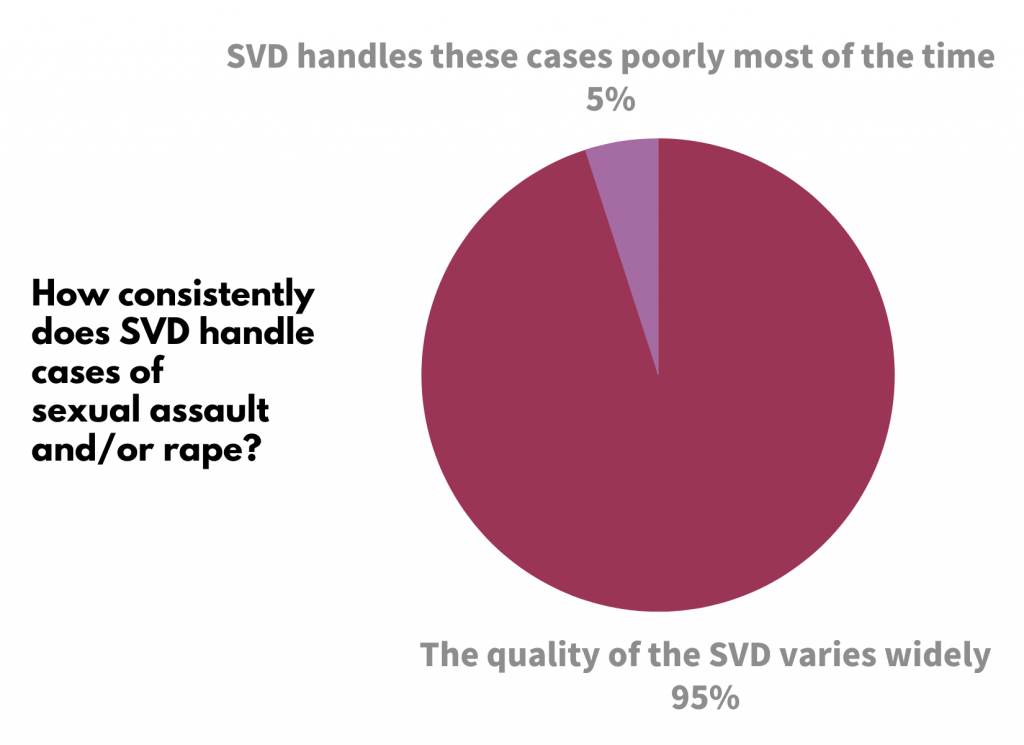
Treatment of Survivors by SVD
Survivors feel ignored by the police (they are never contacted or only given brief, dismissive interviews): 18 out of 20 organizations strongly or somewhat agree that “survivors feel ignored by the police,” and not one organization disagreed with this statement.
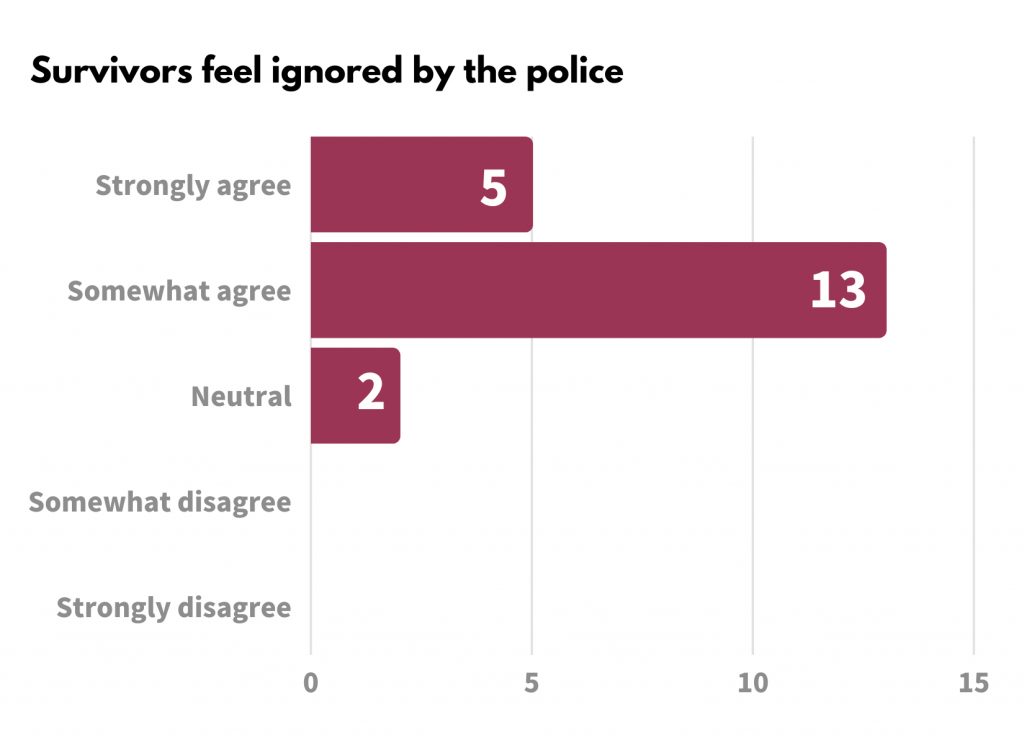
Survivors say it is difficult to get updates about their case (calls or emails are unreturned): 16 out of 20 organizations strongly or somewhat agree that “survivors indicate that it is difficult to get updates about their case” and not one organization disagreed with this statement.
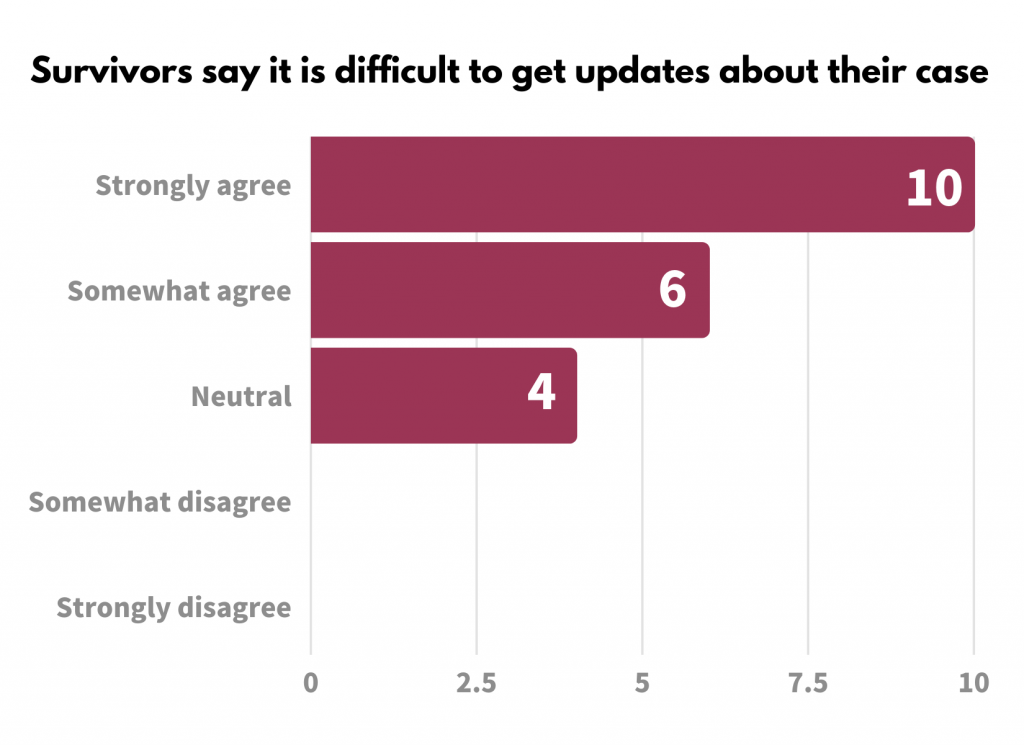
“Survivors are often talked down to, not believed, questioned rudely about any delay in report, and reports are not taken in a trauma-informed way.”
The Takeaway on SVD
Only a quarter of organizations reported that survivors feel the police are essentially doing what is the crux of their job: investigating cases in a timely and thorough manner. Five out of 20 organizations somewhat or strongly agree that “survivors feel like their cases are investigated quickly and thoroughly.”
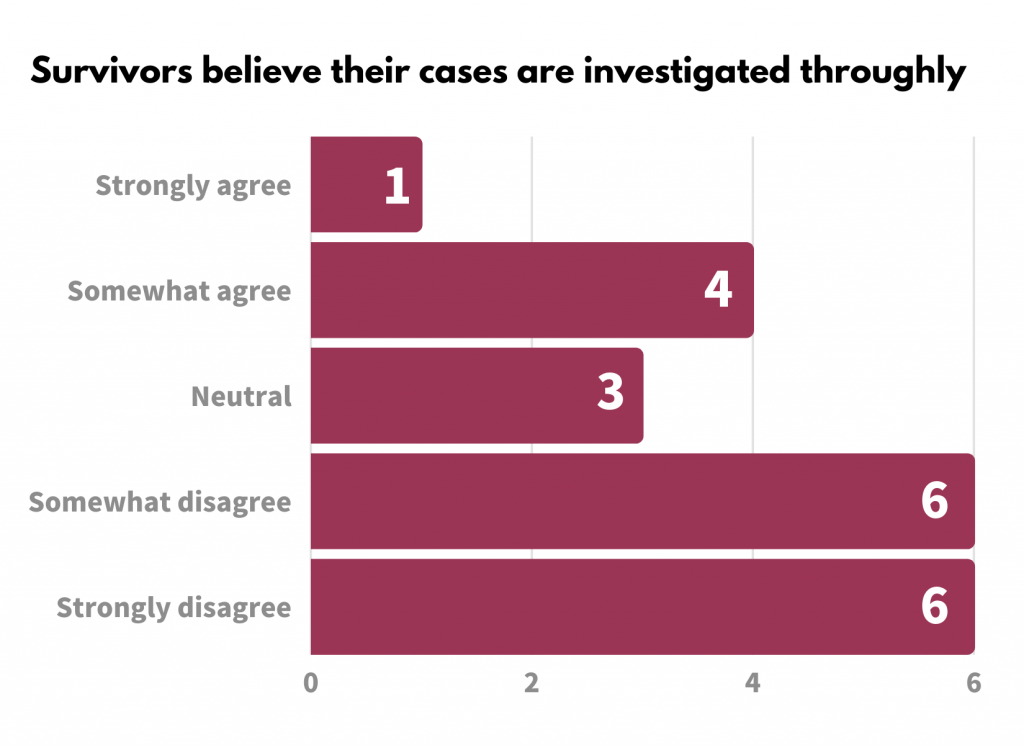
A Roadmap for Reform
Recommendations for SVD
The major takeaway is that SVD’s response to survivors is inadequate and inconsistent. The treatment of survivors varies widely, and survivors who report are at the mercy of getting the “right” detective assigned to their case. These collective results show four main areas in which SVD can take immediate action to improve and systematize an effective response to survivors.
SVD should take further action to improve its approach by:
1. Centering survivors and ensuring a trauma-informed response at every stage of the process.
10 out 20 organizations ranked “more victim-centered, trauma-informed training for the police,” as number one in a list of the most important reforms they would like to see. Organizations responded that trauma-informed care was lacking throughout the process, “Non trauma-informed care in so many parts of the process which just creates more trauma. And our systems focus on the survivor, instead of focusing on the perpetrator.”
2. Increasing the levels of experience and training required for SVD officers and build-in accountability measures.
11 out 20 organizations ranked “Holding detectives accountable not just for clearance rates but for thorough investigations and treatment of survivors” as number one or number two in a list of the most important reforms they would like to see. When asked to name the one thing that could be improved about law enforcement’s response to sexual assault or rape, training and experience were two of the three main areas cited. Organizations said, “Law enforcement should get trauma and cultural sensitivity training,” and “Better and frequent training is VERY needed.”
3. Establishing and championing a culture that respects and supports survivors, without bias.
When asked to name the one thing that could be improved about law enforcement’s response to sexual assault or rape, culture change was one of the three main areas cited for improvement. Organizations said that “building a culture of trust and support,” survivors “being believed,” and providing “resources and social support,” are essential to serving survivors on a path to healing and justice. One respondent said, “Sexual assault cases are not a high enough priority for police agencies or prosecutors’ offices.”
4. Improving coordination and communication with prosecutors to build the strongest cases possible.
This is one of three key areas noted by organizations when asked to consider the biggest obstacle for survivors in getting justice and healing. One organization said, “The resistance to taking cases to trial is a primary obstacle. The police investigate cases to the extent they feel it will end up being accepted by the DA’s Office.”
“The criminal justice process is not set up with healing in mind. It does not take into consideration what ‘justice’ might mean for individual survivors and can very often hinder or add to the trauma of the survivor. The process inherently takes a sense of power and choice away from survivors, when that is very often the very thing they are trying to get back after being assaulted.”
Conclusion
The organizations surveyed in this report constitute the major rape and sexual assault response providers and first responders to thousands of survivors across our city. They represent diverse communities and serve survivors in every borough, and they collectively have decades of trauma-informed experience and knowledge. Their feedback and on-the-ground experiences with survivors must be taken into serious consideration.
These survey results only bolster what advocates and survivors have known for years and have learned time and again through first-hand experience. The data goes hand-in-hand with the findings of a Department of Investigations report from over three years ago, which found a persistent lack of investment in SVD and in the training and experience levels of its investigators. As a result, SVD as a whole is not:
- adequately and consistently meeting the needs of survivors;
- following-through on best practices to stop perpetrators in all cases; and
- fully and effectively implementing the clear and consistent input that advocates, survivors, and anti-violence experts have been advising them to adopt.
The changes the NYPD has initiated are a starting point, but the results of this survey demonstrate that more work is clearly necessary to achieve systemic and measurable improvement.